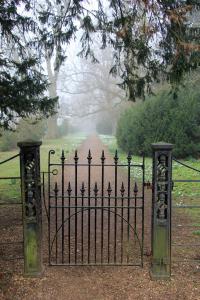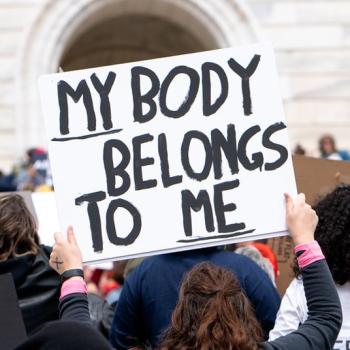Today, let’s look at another teaching of Jesus that has been disinfected and repurposed by evangelicalism: Jesus’ brief narrative on the “narrow gate.”
In Matthew 7, Jesus says, “Enter through the narrow gate. For wide is the gate and broad is the way that leads to destruction, and many enter through it. But small is the gate and narrow the way that leads to life, and only a few find it.”
In Sunday School, I was taught – see if this sounds familiar – that the gate is belief in Jesus. It’s narrow because not just any old belief is good enough. Only belief in Jesus as Son of God, crucified and raised as an atonement for sin will work. I learned that by inviting this Jesus into my heart as personal Lord and Savior would get me through that narrow gate.
I also learned that, as a child of God, I would feel motivated to do good things for others. I was encouraged to do good deeds, but to always be mindful that God did not require them as part of the salvation package (that’s “works righteousness,” and it’s evil).
As I was told, “that’s what the Bible says.” There’s no use arguing.
But – as I’ve found time and time again in my later years – that’s not what the Bible says. That’s what somebody says the Bible says. In recent years, as I’ve grown distrustful of doctrines that I’d never questioned before, I’ve learned to find out for myself what the Bible actually says.
(By the way, if you’re interested in commentary on the journey from evangelicalism to progressive Christianity, please sign up for my newsletter!)
Context is everything – Part One (Matthew)
So, here are Jesus’ words on the Narrow Gate, according to Matthew, in context:
Matt. 7 – Which of you, if his son asks for bread, will give him a stone? Or if he asks for a fish, will give him a snake? So if you who are evil know how to give good gifts to your children, how much more will your Father in heaven give good things to those who ask Him!
In everything, then, do to others as you would have them do to you. For this is the essence of the Law and the Prophets.
Enter through the narrow gate. For wide is the gate and broad is the way that leads to destruction, and many enter through it. But small is the gate and narrow the way that leads to life, and only a few find it.
Jesus is teaching here that we all know how to be kind (when we want to), and the entire message of God’s covenant with his people can be summed up in kindness: “Do to others as you would have them do to you.”
He exhorts his followers to obey this law of love “in everything.”
Then he goes on to urge them to follow the way that leads to life, through the narrow gate. In context, Jesus must be telling them (and us) that God wants – and has always wanted – all people to treat each other with kindness and love. Jesus acknowledges that most people will not choose to do it.
If “kindness and love” sounds too simplistic, consider this: which is easier to sustain for a whole day? – believing in Jesus, or treating everyone with kindness?
Context is everything – Part Two (Luke)
Here are Jesus’ Narrow Gate words in context, according to Luke:

Luke 13 – And [Jesus] went through the cities and villages, teaching, and journeying toward Jerusalem. Then one said to him, “Lord, are there few who are saved?”
And he said to them, “Strive to enter through the narrow gate, for many, I say to you, will seek to enter and will not be able.
When once the Master of the house has risen up and shut the door, and you begin to stand outside and knock at the door, saying, ‘Lord, Lord, open for us,’ and he will answer and say to you, ‘I do not know you, where you are from,’ then you will begin to say, ‘We ate and drank in your presence, and you taught in our streets.’
But he will say, ‘I tell you I do not know you, where you are from. Depart from me, all you workers of iniquity.’ There will be weeping and gnashing of teeth, when you see Abraham and Isaac and Jacob and all the prophets in the kingdom of God, and yourselves thrust out.
They will come from the east and the west, from the north and the south, and sit down in the kingdom of God. And indeed there are last who will be first, and there are first who will be last.”
Here we see that the Master is rejecting those who appeared to be part of his in-crowd. He calls them “workers of iniquity” and tells them to take a hike.
Instead, the Master welcomes guests from the four corners of the earth – including people we would never expect to see (the “last”).
Clearly, again, Jesus’ message about the Kingdom is not a message of conformity to a set of beliefs. In fact, the Kingdom will be an experience of diversity.
I know, dear evangelicals and many others, this teaching goes against your grain. You are firmly entrenched in the doctrine of salvation by believing in Jesus. It’s hard to imagine another way – but there is another way.
Read a little about my journey out of evangelicalism here, and in bits and pieces of other Grace Colored Glasses posts (a few are listed below). At first it was hard for me to imagine believing differently – but now, after just a few years on the other side, I can barely remember what it was like over there.
(If you’d like to comment on this post, please head over to my Facebook page. And if you’d like to try receiving my free newsletter, go here – it’s easy to opt out if Grace Colored Glasses is not your cup of tea.)
YOU MIGHT WANT TO CHECK OUT THESE POSTS:
The Beatitudes: what does God require of us?
Is God’s grace bigger than we think?
The salvation “formula” doesn’t work in the real world
“Wait, the Bible says THAT?” Faith that catches Jesus’ attention
FEATURED IMAGE: “Ickworth Park (NT) 02-03-2012” by Karen Roe is licensed under CC BY 2.0













